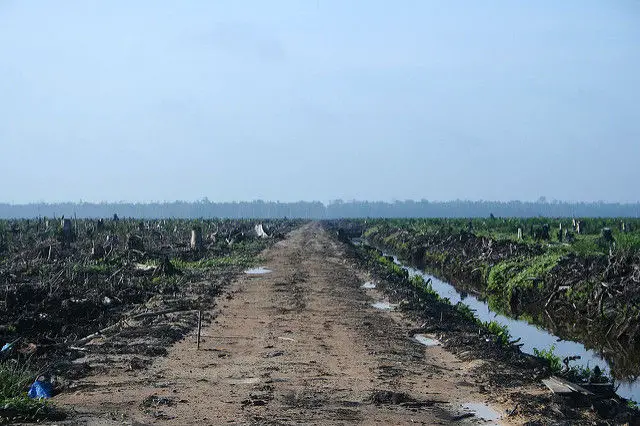Maggie shares this update during her month-long Palm Oil Challenge. Ed
Breakfast: A busy weekday. You grab several muesli bars to eat on the school run or on the way to work, pack a few in the kids’ lunchboxes.
Welcome to palm oil, a rich and creamy oil grown in tropical rainforests, found in most processed foods. When heated to high temperatures, the molecules become unstable, produce a substance that can damage your internal organs, warns the European Food Safety Authority.
Lunch: A cheese sandwich, sliced bread thickly spread with peanut butter and topped with a slab of processed cheese.Palm oil, palm oil, palm oil!
Known to cause cancer. No matter whether the peanut butter is organic or sourced ‘sustainably’, no matter whether the cheese is made from cow’s milk or soya, highly heated palm oil is highly toxic, especially to young children, the European Food Safety Authority warns.
Dinner: Fish and chips from the local chip shop, fried in palm oil.
It is plentiful and cheap. Ask what oil they use before you buy. Pizza, a pie instead, maybe some veggie sausages? Read the label first. Ice-cream for dessert? Check out the ingredients.
Replacing locally grown oils
Not all processed foods contain palm oil, but it has been creeping into our foods for nearly twenty years, replacing more locally grown oils, such as rapeseed and sunflower. Palm oil is cheap because it produces much more oil per acre than any other vegetable source, and because labour is cheap in places like Indonesia and Malaysia, often child labour and slave labour.
But the real cost to the environment is incalculable: the destruction of irreplaceable virgin rainforest and peatlands, the release of massive amounts of carbon that increases global warming and provokes life-threatening extreme weather events across the globe.
Difficult (but possible) to avoid
Palm oil is mostly in processed foods, but also in many cleaning , personal hygiene and cosmetics products. It is also used in biofuels for transport.
Maggie Nelmes, Environmental Campaigns Officer for the Isle of Wight Green Party’s Palm Oil Challenge, says,
“We can choose what we buy. We don’t have to give up our favourite foods to take part in the Palm Oil Challenge, just find an alternative brand that uses a different oil.
“How about UK and European oils that don’t guzzle fuel in transport across the world? That don’t end up in toxic lumps on beaches all along the south coast of England? Fuel used to ship palm oil may soon be coming from oil wells and fracking in beauty spots across the country, polluting land, our water supplies and our coastal waters.
“It may even come from the Isle of Wight.”
Together we are stronger
What can we do? Together we are stronger. So far some seventy individuals, couples and families have signed up to the Isle of Wight Palm Oil Challenge.
To put pressure on huge food manufacturing corporations we need nto join up with several big online campaigning groups: The Worldwide Fund for Nature, Greenpeace and SumofUs.
Just Google them and search for palm oil. Greenpeace campaigners have recently persuaded HSBC bank to stop funding palm oil plantations and SumofUs has persuaded some snackbar producers to stop sourcing unsustainable palm oil.
It is not too late to take up the Challenge. Email Maggie at maggienelmes@talktalk.net
Image: hllewellyn under CC BY 2.0





